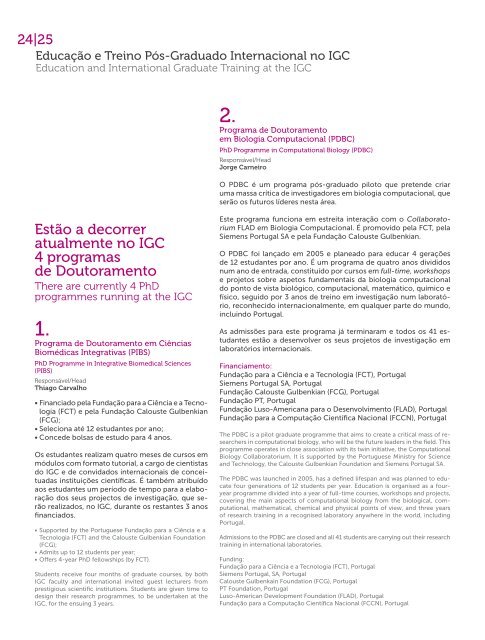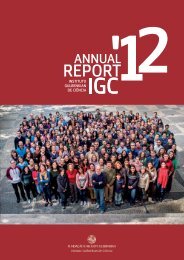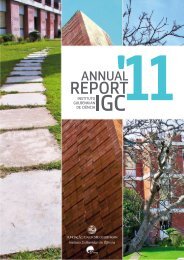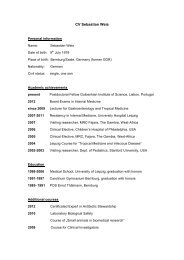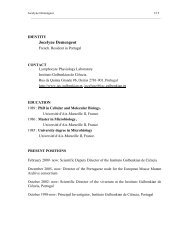the Instituto Gulbenkian de Ciência
the Instituto Gulbenkian de Ciência
the Instituto Gulbenkian de Ciência
You also want an ePaper? Increase the reach of your titles
YUMPU automatically turns print PDFs into web optimized ePapers that Google loves.
24|25<br />
Educação e Treino Pós-Graduado Internacional no IGC<br />
Education and International Graduate Trainning Training at <strong>the</strong> IGC<br />
Estão a <strong>de</strong>correr<br />
atualmente no IGC<br />
4 programas<br />
<strong>de</strong> Doutoramento<br />
There are currently 4 PhD<br />
programmes running at <strong>the</strong> IGC<br />
1.<br />
Programa <strong>de</strong> Doutoramento em <strong>Ciência</strong>s<br />
Biomédicas Integrativas (PIBS)<br />
PhD Programme in Integrative Biomedical Sciences<br />
(PIBS)<br />
Responsável/Head<br />
Thiago Carvalho<br />
• Financiado pela Fundação para a <strong>Ciência</strong> e a Tecno-<br />
logia (FCT) e pela Fundação Calouste <strong>Gulbenkian</strong><br />
(FCG);<br />
• Seleciona até 12 estudantes por ano;<br />
• Conce<strong>de</strong> bolsas <strong>de</strong> estudo para 4 anos.<br />
Os estudantes realizam quatro meses <strong>de</strong> cursos em<br />
módulos com formato tutorial, a cargo <strong>de</strong> cientistas<br />
do IGC e <strong>de</strong> convidados internacionais <strong>de</strong> conceituadas<br />
instituições científicas. É também atribuído<br />
aos estudantes um período <strong>de</strong> tempo para a elaboração<br />
dos seus projectos <strong>de</strong> investigação, que serão<br />
realizados, no IGC, durante os restantes 3 anos<br />
financiados.<br />
• Supported by <strong>the</strong> Portuguese Fundação para a <strong>Ciência</strong> e a<br />
Tecnologia (FCT) and <strong>the</strong> Calouste <strong>Gulbenkian</strong> Foundation<br />
(FCG);<br />
• Admits up to 12 stu<strong>de</strong>nts per year;<br />
• Offers 4-year PhD fellowships (by FCT).<br />
Stu<strong>de</strong>nts receive four months of graduate courses, by both<br />
IGC faculty and international invited guest lecturers from<br />
prestigious scientific institutions. Stu<strong>de</strong>nts are given time to<br />
<strong>de</strong>sign <strong>the</strong>ir research programmes, to be un<strong>de</strong>rtaken at <strong>the</strong><br />
IGC, for <strong>the</strong> ensuing 3 years.<br />
2.<br />
Programa <strong>de</strong> Doutoramento<br />
em Biologia Computacional (PDBC)<br />
PhD Programme in Computational Biology (PDBC)<br />
Responsável/Head<br />
Jorge Carneiro<br />
O PDBC é um programa pós-graduado piloto que preten<strong>de</strong> criar<br />
uma massa crítica <strong>de</strong> investigadores em biologia computacional, que<br />
serão os futuros lí<strong>de</strong>res nesta área.<br />
Este programa funciona em estreita interação com o Collaboratorium<br />
FLAD em Biologia Computacional. É promovido pela FCT, pela<br />
Siemens Portugal SA e pela Fundação Calouste <strong>Gulbenkian</strong>.<br />
O PDBC foi lançado em 2005 e planeado para educar 4 gerações<br />
<strong>de</strong> 12 estudantes por ano. É um programa <strong>de</strong> quatro anos divididos<br />
num ano <strong>de</strong> entrada, constituído por cursos em full-time, workshops<br />
e projetos sobre aspetos fundamentais da biologia computacional<br />
do ponto <strong>de</strong> vista biológico, computacional, matemático, químico e<br />
físico, seguido por 3 anos <strong>de</strong> treino em investigação num laboratório,<br />
reconhecido internacionalmente, em qualquer parte do mundo,<br />
incluindo Portugal.<br />
As admissões para este programa já terminaram e todos os 41 estudantes<br />
estão a <strong>de</strong>senvolver os seus projetos <strong>de</strong> investigação em<br />
laboratórios internacionais.<br />
Financiamento:<br />
Fundação para a <strong>Ciência</strong> e a Tecnologia (FCT), Portugal<br />
Siemens Portugal SA, Portugal<br />
Fundação Calouste <strong>Gulbenkian</strong> (FCG), Portugal<br />
Fundação PT, Portugal<br />
Fundação Luso-Americana para o Desenvolvimento (FLAD), Portugal<br />
Fundação para a Computação Científica Nacional (FCCN), Portugal<br />
The PDBC is a pilot graduate programme that aims to create a critical mass of researchers<br />
in computational biology, who will be <strong>the</strong> future lea<strong>de</strong>rs in <strong>the</strong> field. This<br />
programme operates in close association with its twin initiative, <strong>the</strong> Computational<br />
Biology Collaboratorium. It is supported by <strong>the</strong> Portuguese Ministry for Science<br />
and Technology, <strong>the</strong> Calouste <strong>Gulbenkian</strong> Foundation and Siemens Portugal SA.<br />
The PDBC was launched in 2005, has a <strong>de</strong>fined lifespan and was planned to educate<br />
four generations of 12 stu<strong>de</strong>nts per year. Education is organised as a fouryear<br />
programme divi<strong>de</strong>d into a year of full-time courses, workshops and projects,<br />
covering <strong>the</strong> main aspects of computational biology from <strong>the</strong> biological, computational,<br />
ma<strong>the</strong>matical, chemical and physical points of view, and three years<br />
of research training in a recognised laboratory anywhere in <strong>the</strong> world, including<br />
Portugal.<br />
Admissions to <strong>the</strong> PDBC are closed and all 41 stu<strong>de</strong>nts are carrying out <strong>the</strong>ir research<br />
training in international laboratories.<br />
Funding:<br />
Fundação para a <strong>Ciência</strong> e a Tecnologia (FCT), Portugal<br />
Siemens Portugal, SA, Portugal<br />
Calouste Gulbenkain Foundation (FCG), Portugal<br />
PT Foundation, Portugal<br />
Luso-American Development Foundation (FLAD), Portugal<br />
Fundação para a Computação Científica Nacional (FCCN), Portugal<br />
3.<br />
Programa para Investigação Médica Avançada<br />
-Programa <strong>de</strong> Doutoramento para Médicos<br />
Programme for Advanced Medical Research<br />
- Doctoral Programme for Physicians<br />
Responsável/Head<br />
Leonor Parreira (Destacada para o Ministério da Educação e <strong>Ciência</strong>/ on leave)<br />
António Coutinho (Director Interino/ Acting Head)<br />
• Financiado pela Fundação Calouste <strong>Gulbenkian</strong> (FCG), Fundação<br />
Champalimaud (FC), Fundação para a <strong>Ciência</strong> e Tecnologia (FCT) e<br />
pelo Ministério da Saú<strong>de</strong>;<br />
• Admite 10 vagas por ano a tempo inteiro (especialistas e internos)<br />
ou em regime parcial (internos);<br />
• Os estudantes têm 6 meses <strong>de</strong> cursos pós-graduados, lecionados<br />
por professores internacionais, seguidos pelo <strong>de</strong>senvolvimento da<br />
tese <strong>de</strong> doutoramento em instituições nacionais ou internacionais;<br />
• Os cursos pós-graduados têm lugar em conceituados institutos <strong>de</strong><br />
investigação biomédica portugueses: <strong>Instituto</strong> <strong>Gulbenkian</strong> <strong>de</strong> <strong>Ciência</strong><br />
(IGC); <strong>Instituto</strong> <strong>de</strong> Medicina Molecular (IMM)/ Faculda<strong>de</strong> <strong>de</strong><br />
Medicina da Universida<strong>de</strong> <strong>de</strong> Lisboa; IPATIMUP, Porto; Faculda<strong>de</strong><br />
<strong>de</strong> <strong>Ciência</strong>s Médicas, Universida<strong>de</strong> Nova <strong>de</strong> Lisboa; Faculda<strong>de</strong> <strong>de</strong><br />
Medicina da Universida<strong>de</strong> do Porto.<br />
• Supported by <strong>the</strong> <strong>Gulbenkian</strong> Foundation (FCG), Champalimaud Foundation (FC),<br />
<strong>the</strong> Ministry of Health and <strong>the</strong> Fundação para a <strong>Ciência</strong> e a Tecnologia (FCT);<br />
• Admits 10 stu<strong>de</strong>nts per year, ei<strong>the</strong>r on full time-basis (specialists and interns), or<br />
on a part-time basis (interns);<br />
• Stu<strong>de</strong>nts receive six months’ graduate courses by an international faculty, followed<br />
by doctoral <strong>the</strong>sis work at national or international institutions;<br />
• Graduate courses take place at leading Portuguese biomedical research institutions:<br />
<strong>Instituto</strong> <strong>Gulbenkian</strong> <strong>de</strong> <strong>Ciência</strong> (IGC); <strong>Instituto</strong> <strong>de</strong> Medicina Molecular<br />
(IMM)/Faculda<strong>de</strong> <strong>de</strong> Medicina da Universida<strong>de</strong> <strong>de</strong> Lisboa; IPATIMUP, Porto; Faculda<strong>de</strong><br />
<strong>de</strong> <strong>Ciência</strong> Médicas, Universida<strong>de</strong> Nova <strong>de</strong> Lisboa; Faculda<strong>de</strong> <strong>de</strong> Medicina<br />
da Universida<strong>de</strong> do Porto.<br />
4.<br />
Programa <strong>Gulbenkian</strong>-Champalimaud<br />
<strong>de</strong> Doutoramento em Neurociências*<br />
International Neuroscience Doctoral Programme (INDP)*<br />
Responsável/Head<br />
Zachary Mainen<br />
• Financiado pela Fundação Champalimaud (FC) e pela Fundação<br />
para a <strong>Ciência</strong> e Tecnologia (FCT);<br />
• São selecionados 10 alunos por ano;<br />
• Conce<strong>de</strong> bolsa <strong>de</strong> estudo para 4 anos;<br />
• No fim do primeiro ano <strong>de</strong> cursos pós-graduados, os estudantes<br />
escolhem, com acompanhamento da universida<strong>de</strong> e do Diretor do<br />
programa, um laboratório para <strong>de</strong>senvolverem a tese <strong>de</strong> doutoramento.<br />
* Durante 2011 este programa vai mudar-se para o Centro para o Des-<br />
conhecido, da Fundação Champalimaud.<br />
• Supported by Champalimaud Foundation (FC) and Fundação para a <strong>Ciência</strong> e a<br />
Tecnologia (FCT);<br />
• Admits 10 stu<strong>de</strong>nts per year;<br />
• Fully supported with a four years fellowship;<br />
• At <strong>the</strong> end of <strong>the</strong> first year of graduate courses, stu<strong>de</strong>nts choose a <strong>the</strong>sis laboratory<br />
gui<strong>de</strong>d by faculty and <strong>the</strong> programme Director.<br />
* During 2011 this programme will move to <strong>the</strong> new Champalimaud Centre for <strong>the</strong><br />
Unknown.<br />
25|


